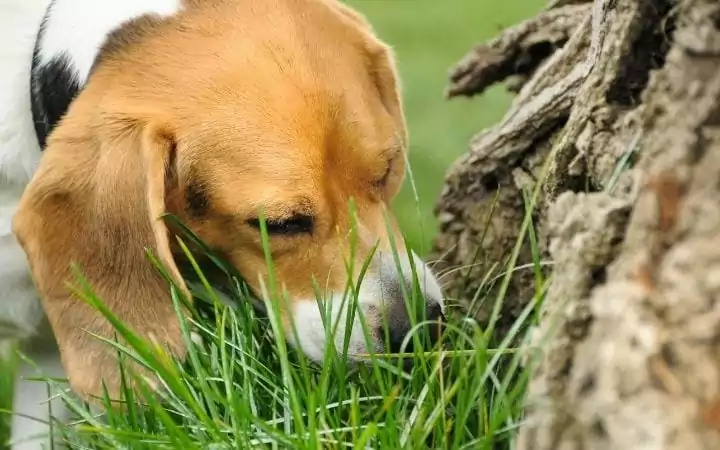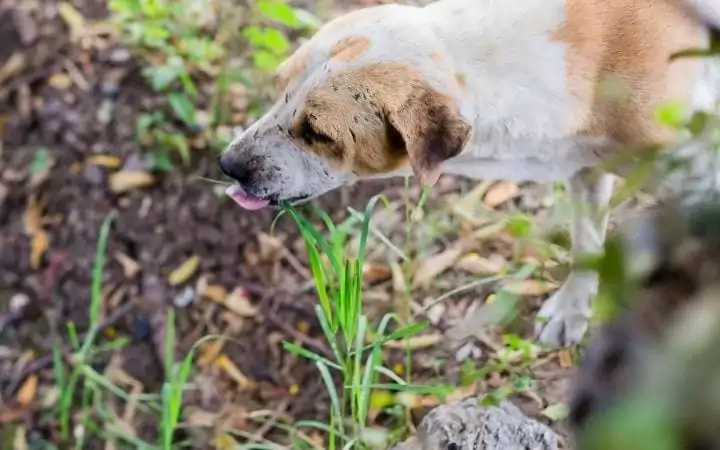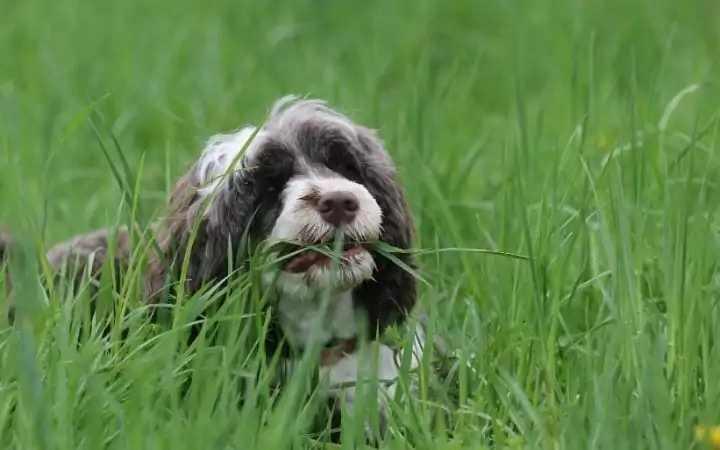It’s a question that has been around for quite a while, and will most definitely still be asked often: Why do dogs eat grass? This odd behavior seems to be common in so many pet households, but still confuses pet owners and veterinary professionals alike. The exact reason why each individual dog does this is still unknown, but there are a few possible explanations that veterinary professionals have linked as to why dogs may eat grass.
Why do dogs eat grass?
It was once assumed that dogs only eat grass to settle an upset stomach. Many people have the understanding that when a dog has a stomach ache, they eat grass to induce vomiting and relieve their discomfort. While this may be true in some cases, we know now that some dogs don’t display any signs of gastrointestinal upset before grass consumption. Some dogs even seem to enjoy eating grass as if it is a daily snack. There are now a few possible reasons linked behind why a dog chooses to eat grass.
-
They are scavengers
When a dog is grazing in the backyard, they may be displaying some hard-wired instincts. Wild dogs are omnivorous, eating both meat and plant material. Dogs in the wild have been seen scavenging for berries, vegetables, and any kind of plant matter they could get their paws on. Researches often find large amounts of plant material in coyote’s stool, proving that this indeed is a beneficial part of wild dog’s diet.
When in the average owner’s backyard, the grass is typically a dog’s only option in terms of plant material. With these facts considered, it is possible that when a dog eats grass, they are fulfilling the needs of their undomesticated roots. Grazing may be instilled in their DNA.
-
They have an upset stomach
If a dog has an upset stomach, it’s possible that they may be seeking ways to relieve their discomfort. Whether it’s how quickly the dog consumes the grass or the tickle it causes in their throat when it is consumed, some dogs will vomit. It’s possible that they remember this action, and repeat it in future scenarios when they have any gastrointestinal upset brewing.
Pica is also a condition that is considered when dogs consume grass. Pica is a term referring to a dog’s compulsion to ingest items when they have an upset stomach. The reason behind any possible digestive disturbance in the dog can vary, but dogs will often turn to grass consumption during this behavior.
-
They are bored
Some dogs need to be mentally stimulated more so than others. If a dog struggles with boredom, anxiety or stress, they may turn to eat grass as a “distractive behavior.” If you find that you have a high strung dog that can’t seem to stop consuming grass, it may be time to step up your dog’s activity throughout the day. Introducing more physical activity and mentally stimulating toys have been found to decrease grass consuming in dog’s who were eating out of stress.
Is it dangerous for dogs to eat grass?
When it comes to safety, there are no true facts that list grass as a danger to dogs. Grass is very simple plant material, and it is not harmful to a dog if they decide to eat it. Grass can, however, become extremely toxic when it has been treated with any chemicals found in yard sprays and treatments. If you have treated your yard or are unsure if the grass has been treated with chemicals, absolutely do not allow any dog to consume it. If you are concerned that a dog has consumed grass treated with chemicals, contact a vet ASAP.
Is grass tasty to dogs?
Though there are more known reasons behind grass consumption in dog’s these days, it is also very possible that some dogs simply enjoy the taste of grass. Some dogs even seem to enjoy grass more at certain times of the year!
In research about this topic, it has been shown that there are no true risk factors behind the consumption of plant materials and some vegetables in dogs. If a dog seems to enjoy eating grass, you can try adding cooked carrots, green beans, or even lettuce to a dog’s daily diet. While these foods are safe for dogs, it is always recommended that you discuss any diet change with your veterinarian first.
Is eating grass a normal dog behavior?
Dogs eating grass is quite a common behavior. With having grass consumption linked back to wild dogs and dog ancestors, it very well might be a habit that is ingrained. While eating grass is a common behavior in dogs, it is important to know that it doesn’t necessarily mean it is normal for each individual dog.
Some dogs may eat grass every single day as if it is part of their diet, and some dogs may suddenly consume large amounts of grass and induce vomiting. It is important to keep track of each dog’s daily habits. While grass consumption is not toxic to dogs, it may be secondary to some other cause.
Summary
The question of why dogs eat grass is a standard one, and there is truly no one simple answer. While the cause behind grass consumption can vary from instinctive behavior to dietary indiscretion, it’s widely determined at this point that it may be absolutely nothing to worry about in some dogs. It is important to know each individual dog in your life and their common behaviors, and it may start to seem more clear as to why your dog specifically is eating grass. Consider these factors above, and your dog’s grass eating habits may start to make more sense!
If you liked this article, read “Pica disorder in dogs” on our blog.

